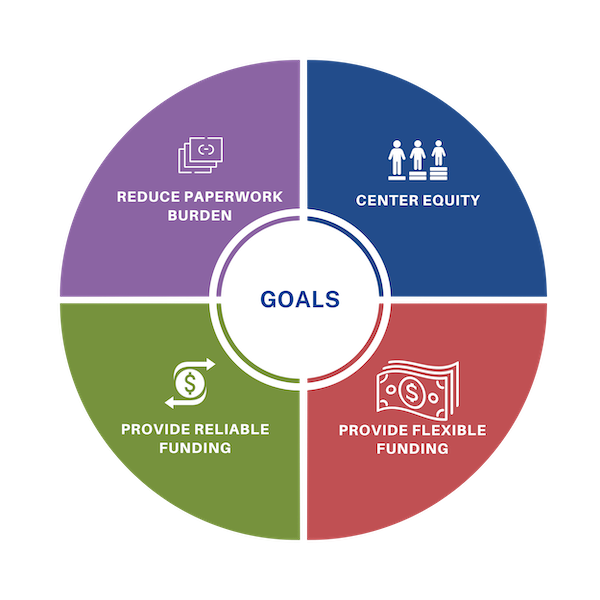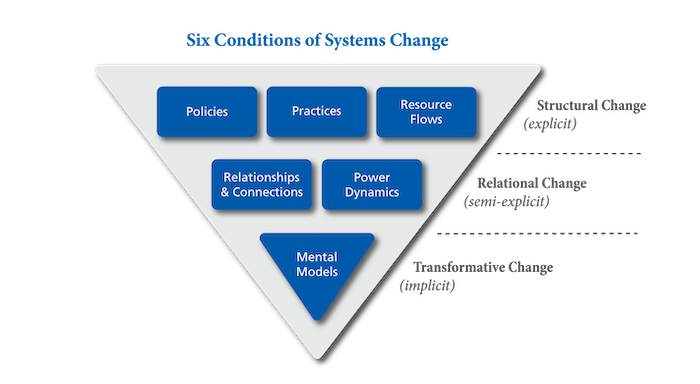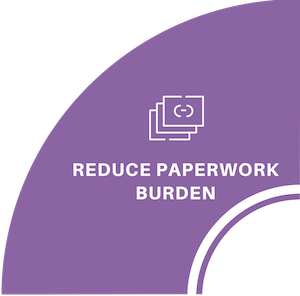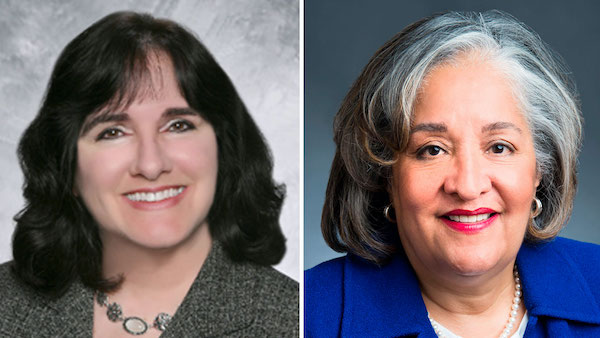Site Search
- resource provided by the Forum Network Knowledgebase.
Search Tip: Search with " " to find exact matches.

Deepening Philanthropic and Nonprofit Partnerships in New Jersey
Doing Good Better, a partnership of the Council for New Jersey Grantmakers and the New Jersey Center for Nonprofits, is a community of funders and nonprofits taking action against the power imbalances and racial inequities in philanthropy, nonprofits and government. Accessible, equitable, and mutually accountable relationships are primary and indisputable building blocks for a stronger society and thriving communities. Our goal is to shift the culture of the New Jersey philanthropic and nonprofit ecosystem by encouraging funders, nonprofits, and government to create shared power rooted in collaboration, mutual trust, and respect.
Doing Good Better Goals: A Framework for Change
The Doing Good Better Steering Committee encourages funders to focus on and advocate for four changes that can make an immediate difference in addressing power dynamics between nonprofits and funders and maximizing nonprofit impact.
Why now?
For many years, but particularly in the context of the COVID-19 pandemic, natural disasters, and the heightened outcry for racial equity and social justice, funders have been urged to embrace more flexibility and transparency in their grantmaking. Practices such as general operating support, simplified application and reporting procedures, multi-year funding and others have been shown to level the power imbalance, advance greater equity, strengthen partnerships between funders and their nonprofit partners, and thereby improve community impact.
Many grantmakers temporarily embraced flexible practices in the wake of Superstorm Sandy and during the height of the pandemic, and these structural changes empowered nonprofits to become more resilient and have a greater impact in their communities. But while some funders have retained the flexible practices, others have reinstated previous restrictions.
In New Jersey and across the country, there is a renewed urgency to NOT return to business as usual. It’s long past time.
Doing Good Better invites all of us to reflect on how power is distributed in our partnerships, learn from our peers, and make adjustments that position all community partners for transformative, equitable change in New Jersey.
How?
Guided and informed by 50+ advisors from New Jersey who represent a broad range of perspectives from nonprofits, philanthropy, and beyond, we are approaching this work through the lens of systems change – the recognition that transformative change can only occur after power structures have been addressed collectively. Specifically, Doing Good Better encourages funders to consider the power dynamics that underpin their policies, practices, and resource flows. To do this, we provide resources and a space for dialogue centered on changes in key practices and culture shifts.
Quick practice changes you can make now.
The road to systems change begins with changing practices that impede nonprofits’ pursuit of their missions, and implement practices that demonstrate respect for and trust in the expertise and experience of nonprofits and the communities they serve. Several key practices have consistently been shown to be particularly effective. Many of these have been requested by nonprofits for quite some time, and are reflected in the principles of Trust-Based Philanthropy and Community-Centric Fundraising, among others. Here are a few practice changes you can make now:
Type of Funding
● Give multiyear and unrestricted funding, especially for grantee partners with which you’ve had long term relationships.
Access to Funding
● Create alternative processes for organizations too small to submit audits to reduce barriers to obtaining grants.
● Set aside funding pools for BIPOC-led organizations that may not have access to traditional funding sources.
Simplifying the Process
● Simplify and streamline application and reporting processes.
● Eliminate annual requests for organizational information that does not change from year to year.
Learning
● Engage with the community through participatory grantmaking that aligns with the community’s goals.
● Open dialogues with nonprofits by soliciting and acting on feedback
How do we know?
We’ve asked the experts: nonprofits, foundations, and community members who are working directly in our community as well as peers from across the country who are eliminating power imbalances in their own communities.
● Feedback from over 50+ Advisors
● The Council of New Jersey Grantmakers survey
● The Center for New Jersey Nonprofit’s survey
● The Trust Based Philanthropy Project
● The Community-Centric Fundraising movement
● Thought leaders and advocates throughout the nonprofit community
● Case studies from across the US

There is a plurality of definitions of the term systems change, each contextualized within different cultures and purposes. Doing Good Better embraces systems change as an inter-sector process that addresses complex social problems nonprofits and funders confront with collective action centered on equity, mutual respect, and resilience. Systems change refers to changing the parts and their relationships within a system with the understanding that this change will have ripple effects. As grantmakers, we need to create an environment that enables grantee effectiveness, so they can deliver on their mission. Systems change in philanthropy focuses on structures, policies and processes, resources, values, power, mindsets and, infrastructure that is illustrated in three iterative phases. In time, we hope that the application of this model will result in collective impact and a more resilient social sector for all of New Jersey.
The first phase is structural (operational) change, which involves funders adopting new policies, practices, and resource flows. The second phase is characterized by new relationships and connections that emerge from structural change eschewing old power dynamic practices. Finally, the third phase is transformative change, which occurs when change becomes rooted in organizational culture and mores. We cannot underestimate the length of time and learning at each stage. Achieving transformative change can be a long journey, but it is a learning journey. One grantmaker stated, “One change led to another and another, like dominos. I started to see what people meant by systemic change. New energy and excitement surged among us as hope grew and the cloudy vision of what we wanted became clearer and clearer.”
Although the figure below displays the six developmental stages as linear and distinct, change is unlikely to follow a linear path. Any change in a system will seldom stay fixed at one of these stages but rather will shift back and forth from one stage to another on the path toward the ideal state. We believe just one organization can’t shift the conditions that hold problems in place; we all must share the same perspectives and move the sector together and simultaneously. We call for all of those involved in the sector to work together to build a better and more equitable nonprofit and philanthropy system for all New Jerseyans.
Graphic comes from “The Water of Systems Change” by John Kania, Mark Kramer, and Peter Senge.
Doing Good Better, a partnership of the Council of New Jersey Grantmakers and the New Jersey Center for Nonprofits, is a community of funders and nonprofits taking action against the power imbalances and racial inequities in philanthropy, nonprofits, and government.
Culture Workers often face inconsistent income and undervaluation of their work. Traditional budgeting models leave many without (or lack adequate support of) fair compensation using the belief that mission-motivation and passion for the work replaces the need for competitive salaries. The Solidarity Economy is an innovative and inclusive economic framework that prioritizes social justice, environmental sustainability, and community well-being. Join us for a compelling conversation about funding practices that use a solidarity-based approach and find out what New Jersey funders are learning about local compensation trends from the ArtsPay NJ report. Together we will explore ways to advocate and take action around worker pay equity and beyond.
Panelists:
John McEwen, Executive Director – New Jersey Theatre Alliance
Erica Nagel, Deputy Director – New Jersey Theatre Alliance
Eddie Torres, President & CEO – Grantmakers in the Arts
Moderator:
Diane Felcyn, Program Officer – New Jersey State Council on the Arts
Webinar Video
Resources
Solidarity Not Charity: Arts & Culture Grantmaking in the Solidarity Economy - Grantmakers in the Arts
Solidarity Economy Resources - Grantmakers in the Arts
Grants to Worker Cooperatives & Small Businesses — The Reader - Grantmakers in the Arts
Grantmakers’ Changes in Practice 2023 — The Reader - Grantmakers in the Arts
Support for Individual Artists’ Committee - Grantmakers in the Arts
ArtsPay NJ - New Jersey Theatre Alliance
ArtsPay NJ - Information, Reports, and Dashboard
ArtsPay NJ - Interactive Dashboard
ArtsPay NJ - Full Report
ArtsPay NJ - Summary Report
Webinars
Upcoming: Wednesday, October 23
Move the Money: Nuts & Bolts: Making Grants to Cooperatively Owned Small Businesses
Previous
Move the Money: Grantmakers in the Arts & Art.Coop Solidarity Economy Discussion Series
Move the Money Series: Guaranteed Income
Move the Money: The Richness of Southern Soils: Supporting Black Farming and Food
Right Size Applications; Simplify Reporting
Affirmation: Paperwork hinders us all.
Duplicative or complex proposal and reporting requirements divert time and resources for both nonprofits and philanthropy, needlessly burdens nonprofit partners and siphons scarce resources away from where they are most needed. Funders can lessen the burden on grantee partners by streamlining the application and reporting processes, especially for repeat grantee partners; decreasing the required data to only the most necessary for decision-making; taking on some of the burden of data collection by gathering data from central repositories such as New Jersey Philanthropy Hub, Candid (formerly GuideStar) and the IRS; and retain and use data already collected from repeat grantees. Funders should require updated information such as annual budget, staffing, board member changes, etc., in their grant applications only when the nonprofit is the only source for this information. Collaborate with other local funders and agree to common GOS application questions and budget templates; streamline tools through technology and offer innovative ways for organizations to apply for and report out on grants; limit written requirements to information that is relevant to the request, and which moves the needle on critical social issues.
Activities
• Reduce rigidity and increase the flexibility of what nonprofits must submit for their applications in creative, egalitarian, and less burdensome ways.
• All funders right-size their application and report requirements relative to the grant amount.
• Shift from reports to conversations or other lower time-intensive means.
• Develop agreed-upon common questions for use across the philanthropy sector for general operating support grant applications.
• Explore the efficacy of using common applications for general operating support grants.
• Change site visits for compliance to goals of learning.
• Consider developing a central data repository for New Jersey nonprofits and funders, where applicants can submit and update basic information once a year, and funders can access the necessary information.
Outcomes
• 75% of funders begin to reduce the size of applications and reports relative to the size of the grant.
• 75% of funders shift from reports to conversations or other lower time-intensive means, like site visits geared to learning and relationship building.
• 50% of funders making general operating support grants accept creative, egalitarian, less burdensome applications including other funders proposals.
• Nonprofits have increased capacity to dedicate time to other activities and efforts.
How to Begin Doing Good Better on Reducing Burden
Learning opportunities
• For funders who do not right-size their applications, what are the barriers to reducing paperwork?
• Who is making the decisions about the application and reporting requirements, and how can they be reached to encourage change? How can we involve more board members of funders in this effort?
• For funders who require reports, determine what is “nice to have” vs. what is needed and used and consider eliminating the rest; what are expeditious ways to collect data including accepting other funders’ reports?
• Which funders who make multi-year grants require a full application for the first year and updates for subsequent years?
Pre-Work
• For funders who already report tailoring their applications, consider how to further simplify processes for grantees; share these practices with other colleagues in philanthropy.
• Learn how information is collected without burdening the applicant.
• Review and implement recommendations already provided by nonprofit networks and philanthropy-serving organizations for concrete examples such as centralized document repositories; allowing nonprofit partners to re-use other proposals and reports; holding check-in meetings in lieu of written reports; and other helpful practices.
• Seek promising practices of funders who use site visits as opportunities to build trust and understand the programs and organizations they support instead of as compliance reviews.
Notes:
See, for example, SMU DataArts (formerly the Cultural Data Project), https://culturaldata.org, a nationwide research and data repository for the arts and cultural community. DataArts serves as a collector and clearinghouse for a wide array of data, which funders can access instead of requiring nonprofits to provide it separately.
Joint Statement from CNJG and the Center for Non-Profits
This statement also appeared on NJ Spotlight.
A conversation between two customers in line at a New Jersey supermarket turned ugly when one man denigrated the other with a racial slur and blamed the fellow shopper for the coronavirus pandemic.
With so much else going on these days, it would be so easy to react to such a seemingly minor incident by saying, oh well, these things happen. Times are tough; tempers are short.
But shrugging our shoulders is not an option. Doing so is complicity in a wrongful acts that too often are repeated, over and over. Our silence merely emboldens those who would tear apart the fabric of our society, whether through hate or ignorance – or the extremely volatile mix of the two.
It’s not difficult to connect the dots between “little” incidents and the systemic racism that leads to tragedies like the killing of George Floyd in Minneapolis. When we ignore or accept any examples of people being demeaned over what they look like or where they (or their ancestors) came from, we only open the door for massive abuses and the wrenching reckoning that follows them.
We mustn’t be cowed by fear of being seen as overly sensitive or labeled “politically correct.” This is about being morally and ethically correct in the face of bias and hatred – and that shouldn’t be too much to ask of Americans, regardless of their political party or ideology.
As state Attorney General Gurbir Grewal said recently, “COVID-19 is no excuse for racism, xenophobia, or hate. Discrimination and harassment in violation of New Jersey law remains illegal even if it occurs against the backdrop of a global pandemic." It’s gratifying to live in a state where the top law enforcement officer speaks out this way.
Unfortunately, it also is a state where reported hate crimes are up in recent years. We can’t tolerate such behavior, whether by police, elected officials or “average people.” There is too much at stake for bias to become the new normal.
As the leaders of the major philanthropic and non-profit membership organizations in New Jersey, representing both the wide range of non-profit groups and the multi-faceted funders of those groups, we feel compelled to speak out against the hateful responses we and our members have witnessed in reaction to the COVID-19 Pandemic.
Our country has seen countless examples of selfless sacrifice and good works over the past weeks, both on individual and institutional levels. We are proud that the members our organizations have been leaders in responding to the needs of our community.
But to our distress, some individuals are using the pandemic to put forward their bias and hatred toward their fellow citizens.
Times of crisis bring to the surface, on the part of some people, the need to scapegoat. Often, this takes the form of lashing out at particular groups, stirred up by inflamed rhetoric or more subtle code words or phrases, having no relationship to facts. In this time, there have been verbal and physical attacks against people of Asian and Pacific Islander background, as there were against Muslims after September 11 and against African-Americans and Latinos in countless other instances. This hatred and these attacks must stop.
The non-profit sector is the backbone of our communities, providing assistance and education to a wide range of people, in good times and especially in challenging times. Many of these services are a lifeline to people of all backgrounds, religions, ethnicities and statuses in life.
Non-profit organizations are the vehicle through which people can work together to selflessly assist others. People around the world view the United States as being unique in the breadth and depth of its charitable and philanthropic work, engaging the talents of all individuals, regardless of their economic or social status.
We call upon all people of good conscience in their good work to be alert for hateful words and actions and – always -- to speak out against them, both as individuals and as organizations.
Our language and our actions do matter.
Everyone, and especially people in positions of public trust or prominence, has the obligation to use our works and our lives to assist all in need and to honor the dignity and potential of all those we meet.
We call on not only our own members, but everyone who serves and volunteers in our sector to join us in this effort to speak out against racism and hatred and to exemplify all the best that we know our country is.
Maria Vizcarrondo
CNJG CEO and President
Linda Czipo
Center for Non-Profits CEO and President
William V. Engel
CNJG Board Chair
Gina M. Plotino
Center for Non-Profits Board Chair
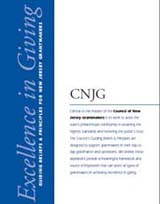
CNJG affinity and interest groups provide a valued forum through which New Jersey grantmakers can connect, exchange information, and learn from experts in a wide range of fields and sectors. Members with a focus on a particular geography or issue meet on a regular basis and are self-organized. For additional information or to discuss forming a new group, contact Chanika Svetvilas.
Camden Funders Affinity Group
Camden Funders Affinity Group provides a valued forum for grantmakers working in Camden to connect and exchange information and to hear from stakeholders working in benefit of Camden.
Culture Funders Affinity Group
The Culture Funders Affinity Group includes private and public grantmakers working in the arts and humanities across New Jersey. It aims to maximize the leadership potential and grantmaking abilities of those interested in developing a strong and thriving arts community in New Jersey.
Emerging Leaders in Philanthropy Affinity Group
The Emerging Leaders in Philanthropy Affinity Group’s mission is to nurture, develop and support professionals in the philanthropic sector across all departments/roles within foundations. Programming for the Emerging Leaders group is geared towards early and mid-career professionals and will serve as: a professional learning community for emerging professionals working in diverse positions; an opportunity for professional development and individual capacity-building that will lead to institutional change within the member organizations; and as a critical partner in the creation of a pipeline into senior/executive leadership in NJ philanthropy.
Environmental Grantmakers Affinity Group
The Environmental Grantmakers Affinity Group formed in 2007 to provide a network and sounding board for environmental grantmakers who share an interest in: (1) insuring a healthy environment for all residents of the Garden State; (2) preserving, restoring and regenerating natural resources, including air, water, land, energy resources, as well as native flora and fauna; and (3) encouraging solution-based responses to resource challenges, wiser use of resources, and sustainable practices at individual, public agency small business and corporate levels.
Finance & Investment Affinity Group
The Finance & Investment Affinity Group brings together grantmakers of all types and sizes to discuss financial market trends and to exchange strategies to help ensure the greatest endowment growth. At each meeting, the latest market performance reports and commentaries are also discussed.
Funders for NJ Education Affinity Group
The Funders for NJ Education Affinity Group connects those making grants in support of education and provides interested members with insights into current initiatives, research findings, and best practices. Past topics of discussion have included analyses of school funding, innovative educational programming, measuring teacher effectiveness and youth development programs and have included roundtable discussions of emerging trends and key issues.
Funders for Strong and Thriving Communities Affinity Group
The Funders for Strong and Thriving Communities Affinity Group is an intrastate, inter-disciplinary network of public and private investors interested in enhancing the quality-of-life of the residents that live within New Jersey communities, through place-based investment or philanthropy. The group aims to draw upon and leverage the knowledge of public and private sector experts in the field of community development; including affordable housing, economic development, job creation, neighborhood building, and services to children and families.
Health Funders Affinity Group
The Health Funders Affinity Group is a collaborative network of grantmakers dedicated to advancing a holistic and intersectional view of health across New Jersey. This group provides a platform to exchange grantmaking strategies, funding priorities, best practices, and valuable insights while fostering collaboration to address health-related challenges and opportunities across diverse populations and life stages.
New Jersey Corporate Philanthropy Network Affinity Group
The New Jersey Corporate Philanthropy Network Affinity Group convenes corporate funders whose giving footprint includes New Jersey. Meetings cover such topics as current and emerging trends in strategic philanthropy, the business case for Corporate Social Responsibility, marketing/branding, sponsorships, employee matching gifts, employee engagement/volunteerism, and more. Best practices are shared and opportunities for collaboration are offered. A traditional Round Robin, where current burning issues/questions are discussed closes out the meetings. We hope you will join us at an upcoming event.
Newark Funders Affinity Group
The Newark Funders Affinity Group began in 2010 as a result of the convening work of CNJG’s Newark Philanthropic Liaison. As of May 20th, 2025, the Newark Education Funder Affinity Group merged with the Newark Funders Affinity Group to ensure alignment and coordination among funders dedicated to the city. The group meets quarterly hearing from elected officials, senior government and educational leaders, members of the nonprofit community, and local civic stewards to better understand Newark's emerging needs and opportunities, all with the goal of leveraging grantmaking for greater impact.
Paterson Funders Affinity Group
The Paterson Funders Affinity Group helps facilitate awareness of work by nonprofits and funders in Paterson, foster collaboration, and improve the lives of Paterson residents. Past meetings have focused on information regarding funder projects in the city, including some new grants made and lessons learned on ongoing projects in the areas of education, health and nutrition, arts and culture, and civics.
Trenton Area & Mercer County Funders Affinity Group
The Trenton Area & Mercer County Funders Affinity Group’s goal is to explore the most pressing needs and issues in the Trenton and Mercer County region and to uncover ways to leverage resources and develop solutions to this community’s greatest concerns. Past meetings have included roundtable discussions on the unique needs of the Trenton area and guest speakers that highlighted the dynamic interrelationship between the City of Trenton and the State of New Jersey.
CNJG’s 2024 Affinity Group co-chairs (name/affinity group):
Front row: Sharnita Johnson/Culture Funders; Leslie Walker/Camden Funders; Bill Leavens/Environmental Grantmakers; Julia Stoumbos/Paterson Funders; Chanika Svetvilas/CNJG’s Manager of Programs and Learning
Back rows: Theresa Jacks/CNJG’s President and CEO; Kevin Callaghan/CNJG’s Newark Philanthropic Liaison; Shakirat Odunsi/CNJG’s Manager of Communications; Julie Holland/Paterson Funders; Katherine Nunnally/Trenton Area and Mercer County Funders; Jasmyne Beckford/Newark Funders; Monica Hall/Emerging Leaders; Erik Estrada/Camden Funders; Jessica Nugent/Health & Aging Funders; Sharif Braxton/Health & Aging Funders; Liz Crowley/Environmental Grantmakers
Not pictured: Tammy Herman/Culture Funders; Alana Vega/Emerging Leaders; Rich Riberio/Finance & Investment; Paul Stierhoff/Finance & Investment; Jessica McKenzie/Newark Education Funders; Pat Hartpence/NJ Corporate Philanthropy Network; Etta Denk/NJ Corporate Philanthropy Network; Kortney Swanson Davis/ Education Funders; Melissa Litwin/Education Funders
Current Vacancies (as of 4/2024): Trenton & Mercer County Funders (1); Strong & Thriving Communities Funders (2); Newark Funders (2)

